March 12th 1912
Country Cricket
Tenindewa Vs Mullewa
The above clubs meet in a return match at Tenindewa on the 10th inst. Mullewa winning by 54 runs. Both teams were well represented. A most enjoyable day’s outing, and an interesting game resulted. The following scores were:-
Tenindewa
Oldham b Thompson 6
Chas. Meadowcroft b Thompson 4
Fry run out 0
Clarence Meadowcroft c Willock b Thompson 9
Tulluck (capt) b Thompson 1
Plummer not out 10
Critch c Willock b Thompson 3
Stokes b Willock 0
O’Byrne b Willock 5
Smith b Willock 1
Davis c and b Willock 1
Sundries 8
Total 48
Bowling Wilcock 4 for 9, Thompson 5 for 16, Warren 0 for 10
Mullewa
Olsen b Cl Meadowcroft 5
A.L. Smith b Oldham 8
J Gilmore b Oldham 7
Wilcock b Oldham 3
Thompson (capt) c and b Tullock 23
D Warren c and b Cl Meadowcroft 0
J Giles b Oldham 20
Molster c Meadowcroft b Oldham 0
C Warren Not out 9
Watkins c Stokes b Meadowcroft 2
Bell b Meadowcroft 1
Sundries 25
Total 102
Bowling Oldham 5 for 27, Meadowcroft 4 for 34, Tullock 1 for 8
June 12th 1912
Tenindewa (No Correspondent mentioned)
Geraldton Express
Things have been happening in this corner of W.A. Five men and a boy decided that Tenindewa was to have a windmill, no other kind of mills being fashionable here since the big farmer wanted to punch the little farmer. The Progress Association must have been joking when they asked the Government to erect one at the New Wollya Well, along with a windmill, lay about a mile of piping to the rail siding, erect a 5000 gallon tank at the Well and another at the siding.
They say it is for the convenience of the settlers coming to the siding to water their horses, etc. Can this be the true reason for wanting about 300 pounds [$600.00] of Government money to spend, especially so, when the Country is so short of money just now. If it is, as the Progress Association say, for the convenience of those settlers who will be carting to the siding, then all I can say is, the expense is not justified, and that the association arrived at its decision without proper consideration. If they considered the matter as if the money was coming out of their pockets instead of the Governments, then I think a cheaper way would have been found.
If a scheme is condemned it is only fair to say, why, and to suggest one in its stead. The settlers can be provided for in a much cheaper way, for next summer at least by simply having a railway travelling tank of Mullewa water left in the siding here, and I am sure one tank would last three weeks, and as it is only required for a portion of the year, the interest on the money desired to be spent would more that pay for the supply required for all the settlers coming to the siding. New Wollya Well is closer than the siding to most farmers who require to use it, in fact with two or three exceptions closer to all of them. Another point is that the water has not been thoroughly tested so far as to the quantity or quality and to go to such a large expense until it has proved itself for a season would be against sound business. The writer drank some of this water after it was left standing in a tank for about a week and it was decidedly brackish. Money is wanted here and elsewhere for other work which would be reproductive.
We want conveniences for trucking sheep very urgently, as quite a number of settlers are going in for wooly backs [sic]. Messrs. Fry, Critch, Oldham and Tullock, Eves, Malony, Stokes, Plummer, and Stafford and Sons have them already, and during the summer fat sheep have been trucked.
We want our siding lengthened also before next wheat season. Any old rails and second hand sleepers would do, and there are men on the spot who could do the work.
Crops are looking very well all round and there is about 3000 acres [1200 hectares] under wheat around here. Mr. Wragge did not frighten our settlers.
A school is badly needed, and as the Railway Department have number of single fettlers here, surely on or two could be removed elsewhere and married men with families sent in their place. Then this would give enough children to get a school teacher provided.
August 31st 1912
Tenindewa Notes (From our own Correspondent)
Crops are not looking so well this past fortnight owing to a very dry month, practically no rain having fallen up to the time of writing. (August 17th). The forward crops are suffering a good deal. Some farmers are going to commence hay cutting this week, and there is some nice stuff to cut around Tenindewa and Mullewa. I think there will be more hay than wheat this season, and the price for chaff should be good owing to a scarcity of feed Murchison way. Talking of feed, some of the best feed paddocks seen for a long while are around Tenindewa, some of Messes Stafford and Sons. One paddock has feed over a foot high (32 cm) for hundreds of acres. It is a treat to look at.
The days are getting warm and water bags are being attended to, and sometimes something stronger by way of a change.
The Tenindewa Dreadnoughts gave the Mullewa Tigers a good doing at football on Sunday last. Several players from both sides put in some good play, and the umpire got through very well. Only his sight needed more range and his running trim was not too good, hence he was rather too far off at times to be sure of his game. Note (Very possible the author was the umpire?)
The Agricultural Hall at Mullewa is almost finished, and it is to be opened with great ceremony on the 11th of September, when included in the show is a cricket match between Tenindewa and Mullewa, which should prove to be interesting, especially the afternoon tea which the ladies are providing. The Tenindewa fellows are good on tea, nothing stronger Mr. Editor.
The Mullewa District Farmers Association is going strong and is likely to prove a good live body, and of much use to the district. They held their second meeting last Saturday and enrolled a number of fresh members. Their regular meeting day is the first Saturday after the full moon.
New settlers are coming around again. Evidently they are the right sort, and not easily frightened with the bad season. Mr. Brinkly [Brenkley] and his three sons, and Mr. Johnson, of Northampton, have settled on Kockatea Gully, below Mr. Stafford and son’s holding. The former [Brenkley] are Englishmen.
The Government water boring water parties (two in number) are still active around the district. One party is at the State Forrest and the other at Bindoo.
Land speculators should be dealt with promptly, as good land is shut up, which would be quickly taken and improved if in other hands. It would be as well if *Mr. Bath would look to such matters as good settlers are looking for land.
(*Mr. Thomas Henry Bath Labour MLA Minister for Lands)

Back John Brenkley, Sarah Alice Brenkley, Herbert Brenkley. Seated: John Brenkley, Walter Brenkley, Mary Brenkley. Photo possibly taken before Walter left for Australia.
September 10th 1912
Tenindewa Notes (From our own Correspondent)
Since my last notes lovely rains have fallen, and farmers are shaking hands with themselves. It is wonderful how the rains improve the crops and the farmers spirits. Such a lot depends on the rains. Even in the farmers family, most promises made are “when the crop comes off,” and if it don’t happen to come off, what disappointment in the family circle, especially the young members. I think the wheat crop is now practically assured, and some good hay crops also will be cut.
Railway facilities are much behind the requirements here, and with a good harvest things will be worse than middling, as the siding is far too short to deal fairly with a good season. There is no accommodation for stock loading, although there are hundreds of sheep kept by farmers, and some have good crops of lambs too. Already several lots of sheep (fats) have been dispatched from here, and a few thousand landed. So why will not this indifferent department of the State get a move on. Everything has to be battled for and fairly drawn out of them. If they were up to date they would keep ahead of requirements. Our Member should note this and impress this matter on the Government. Another requirement is a Saturday morning train from Mullewa to Geraldton, and one back the same day. A carriage on the goods train would do, and would not be expensive. All the other districts from Geraldton have the convenience, but we are the most neglected end of the north.
What shall we do with our harvest? Where shall we market our wheat, chaff, and lambs are matters that are worrying the minds of farmers? Bags and railage will cost farmers about nine and a half pence [10 cents] per bag for wheat and for chaff bags alone per ton 16 shillings, [$1.60] counting 30 to the ton, without freight to market for the chaff. Why can we not have daily or tri-weekly auctions of chaff etc., in the railway yards at Geraldton, with storage at minimum rates. Nine and a half pence [10 cents] per bag for wheat should make the Government waken up to the need for bulk-handling. Now then Farmers Association move on. You have plenty to battle for. You cannot pass your extra expenses on like others, and you have the world to compete with in your main production product, wheat.
Further why don’t the Government introduce the “through bill of lading” now they have their steamers running on this coast. They subsidized the old Julia Percy. If they would do this it would be a good help and to the Murchison people.
A “through bill of lading” is a legal document that allows for the transportation of goods both within domestic boarders and through international shipment. The “through bill of lading” is often required for the exporting of goods, as it serves as a cargo receipt, a carriage contract, as well as the title sometimes for the products.//// With thanks to Google
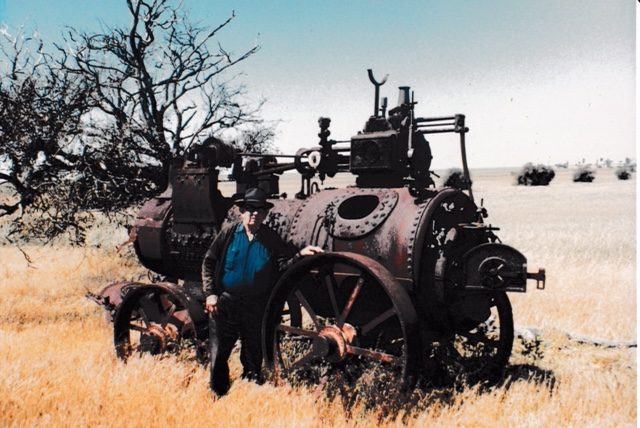
This steam engine was originally owned by Norman Fry of Tenindewa and it still operates to this day.
It is now owned by the Royal Agricultural Society of WA
September 19th 1912
Country Cricket
Mullewa Vs Tenindewa
The above teams met at Mullewa on Wednesday last, 11th inst. After a very friendly and enjoyable game Mullewa won easily. Two or three of the visitors best were unfortunately absent. At four o’clock the players adjourned for afternoon tea, kindly supplied by the ladies. The following are the scores;
Mullewa
J Cutler c Oldham b Gee 44
G Gilmore b Perejuan 17
W Willock b Oldham 3
A.E.Douglas c Stokes b Perejuan 2
D Warren run out 0
Thompson (capt) c Tullock b Oldham 22
J.F. Giles b Gee 16
Olsen b Stokes 23
May not out 7
C. Warren b Stokes 0
Bowtell c and b Stokes 7
Sundries 18
Total 159
Tenindewa
J. Gee b Thompson 18
Perejuan b Cutler 0
Tullock c Giles b Cutler 7
Oldham (capt) b Thompson 0
W,H Stokes c Bowtell b Thompson 0
L. Critch b Thompson 0
Coulton b Willock 0
N. Fry b Willock 4
Davis b Thompson 1
Rumble 2
Sundries 3
Total 44
October 5th 1912
Tenindewa Notes (From our own Correspondent)
Crops are looking well, owing to the nice showers, and most settlers are now hay making. Some splendid crops are being cut by Messes. Valentine and Dunkin, and Stafford and Son. Many do not believe in late sowing of wheat and Professor Lowrie, a few days since spoke very strongly against it. Some late crops here (middle and later in June sown) are looking just first rate, and in many respects beat the earlier [sown], as the dry August did not hurt them to any extent, Bunyip and Crossbred 73 and Alpha appear to be the most desirable wheats for this district. They cure quickly and make good growth for hay or wheat. Peas do splendid here, and Messes Stafford and Son, and J. Bowes have nice crops this year, the former in real sandplain with good growth, flowering and podding well. I saw a patch of lucerne, a few days since, that was sown in July 1911. It stood the drought last year and is now a foot high. It has not been cared for, and stock have grazed on the same. It is sown in sandplain, and with a fair season I believe it could be grown successfully.
With regard the Geraldton Chamber of Commerce, are those people really the farmers friend, or are they too much interested in the cockie’s purse? It appears to me they are mostly shipping agents. Why do the not take up “the through bill of lading” for the Government boat so as to help the settlers? Perhaps it would lose some Geraldton agents good sums. The Government are always saying what they are doing. Why cannot they do this and materially help farmers and the Murchison people.
Thousands of tons of [the] best firewood are being burned around Tenindewa, and close to the siding at that, owing to the excessive rate charged by the railway Department, vis one penny per ton per mile. If the Railway Department was a private concern, do you think this would be allowed to go on when hundreds of empty trucks are passing towards Geraldton weekly. Would it not pay rail to carry it for half penny per ton per mile? They do not handle the stuff, and as most of the trains are light, it would be a very profitable undertaking, but the Railway Department are too slow to recognize a thing of this kind. Why does the Minister for Lands or Railways have a turn at the matter. Surely it has been brought under their notice, and it would help the early settler also.
Two water boring parties are still out trying for water, and have been successful near Bindoo, but the well near Mr. Troy’s block and the one near Stafford and Son, are reported to be worse than middling so far, not having opened up too well. There must be something wrong with the testing prior to sinking wells?
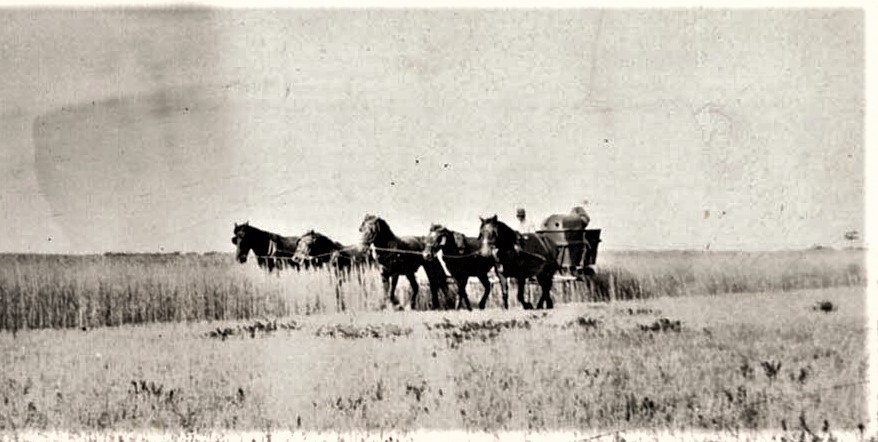
Stripping on Alec Rumble’s in the early years.
January 4th 1913
Tenindewa Notes (From our own Correspondent)
Another year just started Mr. Editor, and I believe in the number 13. I predict a bumper season for 1913. I am not going on sun spots or those kind of things but just on a guess which is nearly as comforting.
Harvest is nearly over in the district, except in a few cases where delay has been caused by machinery breakages, and this being a very bad season for stripping, too moist and not enough drying wind. Averages are small for wheat yields. I think about 9 or 10 bushels [.6 to .7 of a tonne per hectare] will be the average. All over great preparations are being made for a big cropping this year, and fallow and large areas are the order of the day. Who will be the first farmer to have 1000 acres in for one season. I think a prize should be offered by the Agricultural Association. Quantity of wheat is what most farmers are after. Quality of putting it in is all right, but does it pay to spend time on it? I think not in this area. A dry farmer here who wrote and spoke on this subject not long since, put the whole of his past seasons crop in with a spring tooth cultivator, and as far as I can see, he fared as well as any. Our district is a light soil even in the York Gum country.
Complaints still come from farmers of short weights and shortage in bags from buyers. Why don’t the farmers insist on the buyers taking delivery at the sidings. They have the matter in their own hands. I recollect a case of thirty-three bags of wheat being sent to Geraldton and the farmer lost six and a half bushels in weight, and when he complained they said, “oh that was the railways weights”. I’ll bet if it was six and a half bushels over what it should have been, they [the merchant] would not have taken the weights.
When is the government going to help farmers by exporting their wheat, making manure, and importing bags. At present it is the opinion of some farmers, that it is no good growing wheat or hay under the present conditions, as they have to content against dear manure, with uncertain delivery, dear bags, and slow delivery, and a small price for wheat, and loses in numbers of bags and weight.
The State school is almost an accomplished fact now here, and operations will commence this month. I understand Miss. Eva Stafford’ late of teacher at Geraldton High School, has been offered the position of teacher. She was a prominent pupil of Mr. Grogan’s who was head master of the State School Geraldton, and she then went through a course at the Methodist Ladies College, Claremont. The school is badly wanted and a good deal of thanks for obtaining same are due to Mr. N Fry.
Christmas passed off quietly, with a good many grafting, taking off crops.
The 300 yards Government dam near Messrs. Valentine and Dunkin’s place, is nearly completed, the contractor being Mr. J. Saunders, and he is making a good job of it.
I wonder who is responsible for Wollya Reserve. Horses and other stock are running regularly on it, and a man and his family and a team of horses, have been camped there for months. The Mullewa Roads Board should wake up and see this.
Old Wollya well wants putting in order as the dry spell is here and farmers still want stock water. Stacks of wheat are allowed to lie too long in the siding here before the Railway Department shifts them. This poor tired department keeps up a long Christmas, and no lengthened siding has yet been provided although it has been promised.
[In making a case for “Our Own Correspondent” being in real life, Leo Critch, it is worth noting that the general health Wollya Reserve or lack of it is “one of the pet subjects” of “Our Own Correspondent” as we read through the articles over the years. Leo’s house was about 400 metres west of the Wollya Boundary and about 1.5 kilometres south west of the dam. He would have had a bird’s eye view and a big vested interest in it’s wellbeing?]
Eva Dunkin (nee Stafford) was the first teacher at Tenindewa school

January 14th 1913
Tenindewa Notes (From our own Correspondent)
Christmas passed off quietly, with a good many grafting taking off crops.
The 300 yard Government Dam near Mr. Valentine and Dunkin’s place is nearly completed, the contractor being H.J. Saunders, and he is making a real good job of it.
I wonder who is responsible for the Wollya Reserve. Horses and other stock are running regularly on it, and a man and his family and a team of horses, have been camped there for months. The Mullewa Roads Board should wake up to this.
Old Wollya well wants putting in order as the dry season is here and farmers will want stock water.
Stacks of wheat are allowed to lie too long in the siding here before the Railway Department shift them. This poor tired Department keeps up a long Christmas, and no lengthened siding has yet been provided, although it has been promised.
January 18th 1913
Tenindewa Notes (From our own Correspondent)
Tenindewa has about finished harvest for this season. The results are a little below satisfactory, but the crops will still help the settlers to liquidate some of last years liabilities. Two bad seasons in succession should be rewarded by a bumper in 1913. Conditions in the weather line appear to be changing. I have not seen the barometer so low for a long while as it has been for the past few months. It has been lower than anytime in the last two years.
There has been very little hot weather here so far this summer, but still the water carts are plying freely to Wolya Dam.
Speaking of the dam reminds me of that tired body called the Mullewa Roads Board. They have time to have a notice placed at the dam instructing the ratepayers that they must not use the dam water for sheep or cattle, and appointing the two largest users of water from this dam to be in charge of same. Why should a settler not water his goat and kid as well as a cow and a calf and a few sheep? Now is a settler to pay his rates to find water for horses alone? He may only care about breeding sheep. Now the catchment of this dam is not fenced, and the people are allowed camp on the dam for months at a time with their horses, etc., and the catchment is filthy, and contaminating liguid runs into the dam. The Old Wolya Well is out of repair, when a few pounds would fix it up well, but the Roads Board is asleep. Tenindewa pays the bulk of the taxes, still only a few favored ones here can get anything spent on the roads, etc. The outback settler out Bindoo way, cannot get to the siding without trespassing through private property, although the Roads Board has been approached repeatedly about it. But they prefer to spend money on the Mullewa roads which are already hard and do not require any spending on them, and when the heavy rains set in the work they have done will be washed away.
What are the police doing at Mullewa? I was informed there were dozens of drunks lying around Mullewa at Christmas Holidays, and any Saturday night now public things are lively. I understand Mullewa has two “johns” now and the taxpayer has to support them, although if the public house was not there they would not require one.
You should have seen our worthy Hon. Speaker [of the House] handling wheat a few days since. He is quite an artist at it. He is spending a few days holidays round this part where he has a farm.
I went to a farm the other day and saw a cow evidently being milked by novices. The good lady of the house was in the stall; one girl the tail and one girl the leg rope. I did laugh. It is a fine thing for settler to have large families. The poor cow had no chance, and had to give her milk to them.

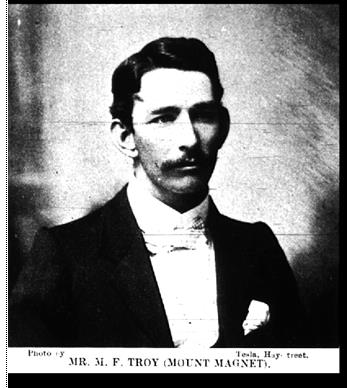
Above; M.F.Troy it was who led the change in abolishing the wig for the Speaker in the WA Parliament. Michael Francis Troy MLA (Member for Murchison) and Indarra farmer
February 6th 1913
Tenindewa Notes (From our own Correspondent)
Well, Mr. Editor, there are only two farmers who have not finished harvesting in this part, and they expect to finish before next Christmas.
Most of the cockies are new at the game and hence they are in the experimental stage. Of course, they receive plenty of advice from papers and others but, experience unless bought, is no use. It is too cheap, and not one in twenty will take it. We have bought a lot in the last two years here. It has been very dry, and neither will pay a dividend. Talk of selling out is common, but this cocky is going to stay till he is sold out, because what is the use of leaving a dry area when a man has bought two years hard experience? My advice to all is sit tight and graft, put in a lot of crop. It does not matter at whose expense as long as you get it in. Things are pretty bad around this and the Mullewa district again this season. Crops are very light, and it is a certainty they never paid to put them in except in isolated cases. The fault was not shortage of rain, but it came at the wrong time, and crops that at one time looked good enough for any yield up to 25 bushels, faded to about 6 bushels. In one case of 300 acres, only 60 ton of hay and less than 300 bags of wheat were taken. With wheat about 3 shillings a bushel, and bags at 8 shilling a dozen, how can this crop pay for taking it off and putting it in. Cocky had to buy his seed and manure owing to the failure of the previous year. Let some of the machinery men who are grumbling at the farmers for not being able to pay two years machinery bills at once, work out what this cocky has for his keep, men etc.
This is enough about the backbone of the country.
With regard to the Progress Association at Tenindewa, RIP can be written.
The Government boring party are still at it spending money in boring for water, instead of putting down dams at suitable places or trying an artesian bore. A number of bores have been put down within a 20-mile radius of the railway siding and with practically no success. As the bores are a failure, why not dam the water. Mr Editor the poor cockies often do, when carting water, anything up to six miles and the sun 100 degrees in the shade. [38 degrees C]
Wollya will soon be dry, and it will prove to the Government Water Department that small dams like this (1100 yards) are of no use. It has a good catchment, why not increase its size and it holds like a water bag.
I think Roads Boards are a failure and they should be wiped out and replaced by a road superintendent and repairers in the districts. The matter would be attended to as needed. Do you think a superintendent would leave settlers with no way out from their holdings, when by spending about 2 shillings per chain they could get a track cut for the poor beggars. A few pounds would do the job, still they take absolutely no notice of the letters from these settlers. Messes. Brenkley, Carboy, Johnson and others who are on Kocketea Gully have to come through private property. Settlers have written the Hon. Minister for Works. That may have some effect, but why should it be necessary? They find money for less urgent works. What is the supervisor doing? Why not have all the roads inspected and reported on in a business-like way and do the most urgent works? What about the ward system for this Road Board. It is close to the elections again, but this matter seems to have died. Perhaps some of them are afraid of their seats?
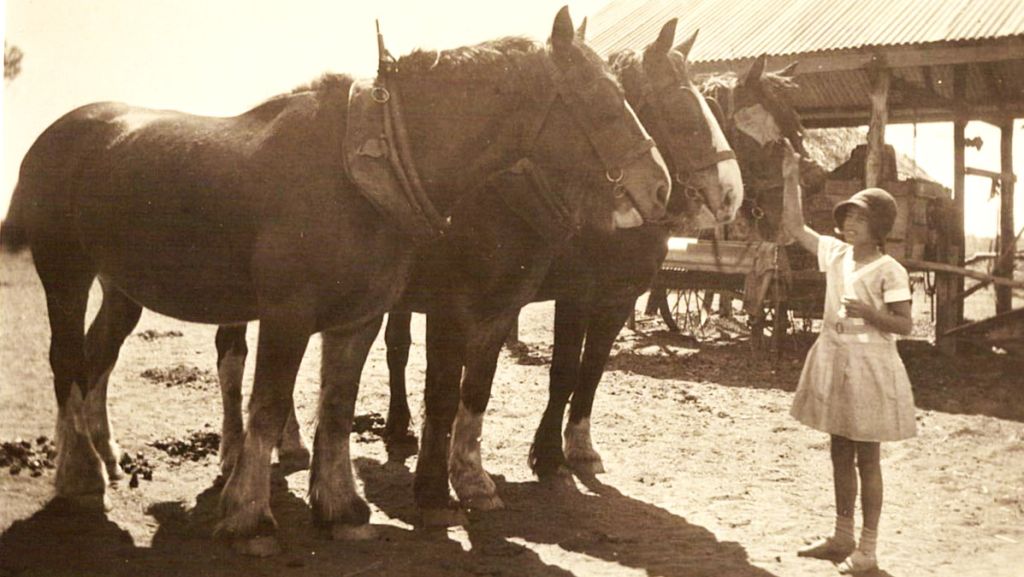
Vera Constance Rumble at the home farm one kilometer north east of the store (about 1930)
April 5th 1913
Tenindewa Notes (From our own Correspondent)
Tenindewa is quiet again now, the harvest being finished, and in most cases the money spent.
The Workers Compensation Act is not good for farmers, and farmers are not very anxious to employ labour in consequence. He is far too heavily taxed already through the Customs, Land Tax, Income Tax, Wheel Tax, Fire Arm Tax and Road Tax. From the latter he receives practically nothing. Only one or two farmers round here can get roads made. Other can beg and pray, but without effect.
The Mullewa Roads Board badly wants a change in its composition. It requires some business men on it. They are spending money round Mullewa on roads that were better in their natural state. The country roads are neglected, and the usual cry is “no funds”. Then the expenditure on Roads Board elections could do with investigation, and it would be interesting to know how much elections have cost during the last twelve months. The Roads Board Act needs revising in more ways than one.
The District Farmers Association is not booming and the platform they have adopted is practically the Liberal platform. One plank in their platform insists upon freehold in land. Why could not they have made this optional, so that a man could take it on lease or freehold just as he desired. That would be Liberal then I think. A good many will withdraw out of the Association now, whilst in my opinion they are too stiff in their expenses at the Executive Office.
Very heavy winds have been the rule lately, mainly off the land. A few light showers fell on March 31st, about enough to wet a light silk coat.
Some farmers will commence to seed next week. It may do for some [wheat] varieties, and too early with wheats like Bunyip, Alpha and Fairbank [and that] is as bad as..too late. Some farmers are only going to sow small areas this season, and fallow for the next. Others have a fair bit of fallow for this season, and it will be interesting to watch how fallow lands yield here.
The State School has commenced operations, a start being made on Monday last with 13 pupils, a very lucky number Mr. Editor.
April 3rd 1913
Note: The school building spoken of here was supplied by Normal Fry on his land south of the siding.
The Government supplied School in Wolya Reserve behind the Store opened two years later ready for the 1915 School Year
May 1st 1913
Tenindewa Notes (From our own Correspondent)
All the farmers around here are hustling all they know to get a fair lump of Australia under wheat. They are the most generous people in the world, they grow wheat at a loss so as to give the agents a chance of making a living, but the coming season they really expect to make a little on their sowing as Wragge predicts a better season than last. (it would not be hard to strike a better season than last) He also says seasons are to gradually improve, and that he is in communication with the sun and the moon so as to have this done.
The Wollya public dam is dry and settlers are now on new Wollya well and Wollya soak. The latter is good water, but the well is going the same as the old Wollya well, which is really only sheep water. They say sheep water Mr. Editor, because sheep can drink water as salt as the sea or fresh, whereas horses do not like it salty. Speaking of the new Wollya well reminds me, that some settlers here, who call themselves a Progress Association, wanted the Government to spend about 300 pounds ($600.00) last season by placing a windmill on the well, laying water onto the siding, and a 5000 gallon tank (20,000 liters) at each end, although the well had not been tested for quality and quantity, but thanks to other settlers objecting, it was not done and as the water is proving inferior, it plainly proves the Government should be cautious and prove things first.
There is a small craze for cycling around here and the younger settlers are practicing with a view to showing the Geraldton boys how cockies can ride.
Not much interest is being shown in the Federal elections.
A new settler has had a very rough time, what with the cost of machinery. etc., then the dry seasons on top. The last two seasons have done a great deal to choke off settlement, far more than any legislation. The money market being so tight has made matters worse, as storekeepers could not afford in many cases to give long credit. Some storekeepers have, and they shall assuredly receive their reward, if not here then above.
I intend dealing, with the last Mullewa Board election in my next article, Mr. Editor, and I assure you it will be very interesting. Very funny people these Roads Boards, they collect taxes and promise roads.
There is no rain yet.
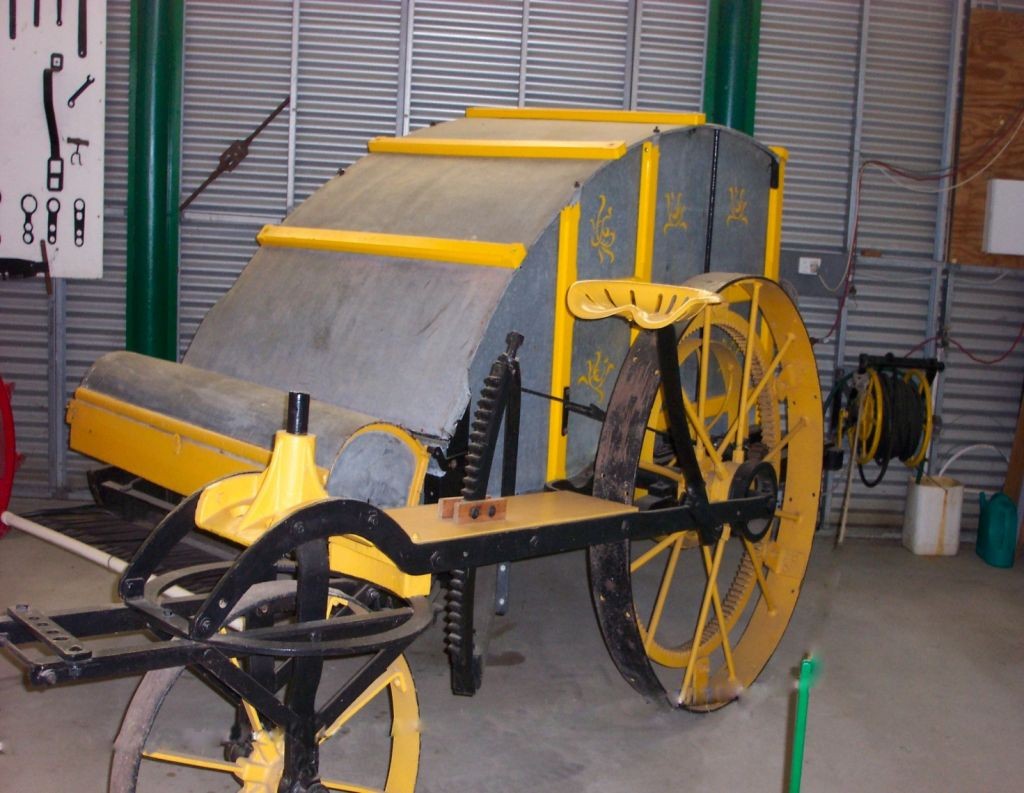
A typical Stripper for 1913
May 22nd 1913
Tenindewa Notes (From our own Correspondent)
We have had some nice rains since my last notes, and wheat is above ground and looking very well. Farmers are smiling in most cases. Water carting has about eased, and no one knows what a relief it is to be able to say, “well no more water carting for some months.” The largest area ever under crop is in this season and a good deal of wheat under fallow also, so now we shall see how it pans out.
Wollya Dam is still being polluted by horses being allowed to roam on this reserve, the water catchment not being fence in. The Health Board should take notice of this, as settlers have to drink this water. The Mullewa Roads Board are evidently too tired to take any action although it has been brought under their notice before.
The Road Board are talking of making settlers fence along roadways so as to avoid gates. [across public roads]. This is rather premature in a new settled district which has just gone through two dry seasons with short crops. Along the Main Road is all right, and where settlers will put up abominable gates instead of buying a decent iron one, or other properly made gate[s]. I never saw in my life such a variety of gates [as] there are here. The Road Board should insist on proper gates and fastenings.
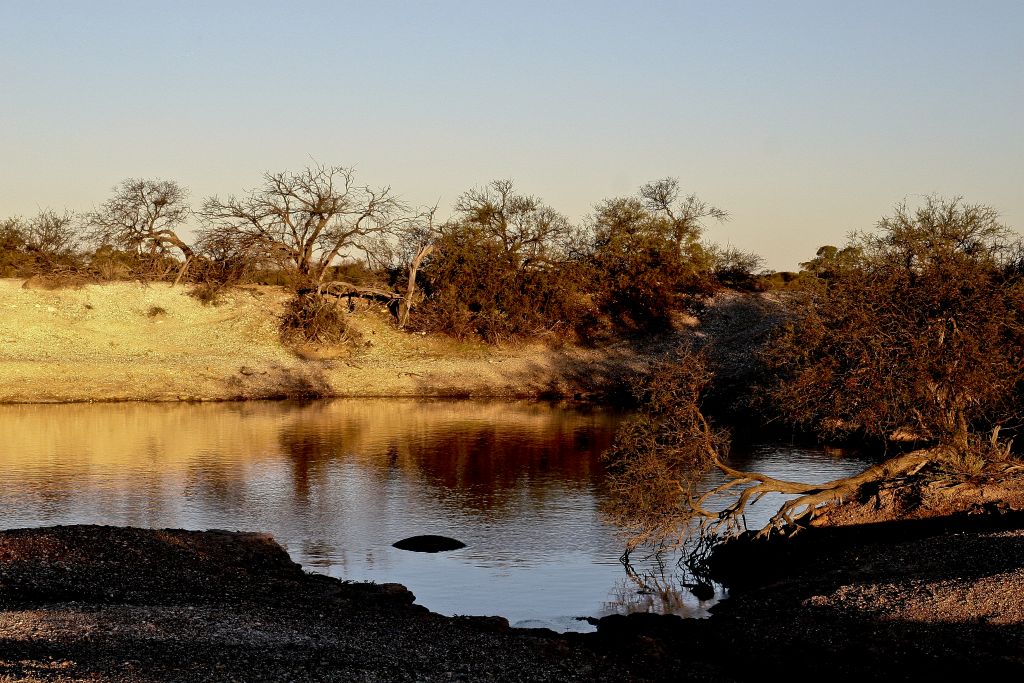
Wolya Dam (2015)
July 8th 1913
Tenindewa Notes (From our own Correspondent)
The crops around this district are looking remarkably well, and some large areas are in this season, and with a good harvest, and the prospect of a good price,. the farmers should overtake the bad seasons. Mr. Fry has sown 600 acres under wheat this year, and others have from 400 acres [160 hectares] down to 100 acres [40 hectares], a much larger area than any former year. Alpha and Bunyip are the favourite varieties this year; most are shy of Federation. I think we could have more rain than around Geraldton, and there are some nice pools in the Kockatea Creek, and the dams are half full. The rain has been mostly of a good soaking nature.
The State School is progressing well, and has 13 scholars on the roll. It will soon be time to have a fair building put up to accommodate them. A block has been reserved in the Tenindewa Townsite for school purposes.
The Mullewa Roads Board are apparently not a very happy family, and I am told that the debates at the last meeting were of a loud nature. The writer was talking to a cockie, and asked him if he went to the Roads Board meetings. He replied: “I had no occasion. I could hear them from the Railway Station.” They must have been having some fun. Kangaroos are very plentiful round here, and are very fond of having a game in the wheat plots. They are very hard to get with the rifle, there being so much scrub, and as the settlers have a few sheep, they do not care to have to have dogs running through the paddocks. I would suggest a few real good kangaroo drives. It would be great sport, and would give them a great scare, and would effectually stop their attention to crops.
July 22nd 1913
Tenindewa Notes (From our own Correspondent)
Very nice rains have visited this district, and the crops are looking just the thing, and farmers faces are pleasing to behold. They could easily be tapped for a loan now if they had any money left after two dry years.
Mr.G.L.Sutton, the Wheat Commissioner, gave a very interesting and instructive lecture on wheat growing and treatment of the soil at the school on Wednesday evening. There was the largest attendance at any meeting so far in this place, over thirty being present, many from long distances.
One old lady and her daughter (new arrivals from the Old Country) came in ten mile to hear the lecture, and if they don’t succeed as wheat growers, they should, or rather they deserve to.
Mr. Sutton was favorably impressed with the country here and sees no reason why it should not grow good wheat crops, including Federation. He paid visits to many farms and considering the difficulties settlers have had to contend with for the past two seasons, I think he was satisfied. He also dealt in his lectures with rotation of crops, so as to keep the ground fertile and well stocked with proper elements, pointing out the advantage of sheep on the farm. He said all settlers should have a cow, and Mr. Editor and I should say a calf too. (I bar goats, they are too mischievous)
Its a pity that Mr. Sutton’s visit could not have extended over a day, as some things which farmers would like to talk on and get advice about, must be missed with only one day available for all, and being so scattered, we dont all want to be tied to wheat alone, as it has proved here that lucerne, field peas and sunflowers can be grown here even with years like 1911/1912. One thing I would like to see at the lecture, and that is a portion of time at the end, set apart for answers to questions from farmers. This officer’s time is very valuable, and I think it could be used to far greater advantage if he were supplied with a motor car. He could see twice the number of farms in the time, besides giving so much more to farmers. In fact it would be almost as good as having two commissioners. He is without doubt, a most valuable officer, and if wheat production and improved farming do not take place it will not be the Commissioner’s fault.
Since the advent of new blood in the Mullewa Roads Board, more useful work appears to be done. I notice new roads being cut in various parts of the district.
Note; George Lowe Sutton (1872-1964) was born in Lancashire, England. He became a renowned and enduring Australian agricultural scientist and was a great friend of the famous Australian plant breeder, William Farrer, who produced the iconic variety “Federation” which was a massive breakthrough in wheat breeding in Australia at the time of Federation (1901)
August 19th 1913
Tenindewa Notes (From our own Correspondent)
Rain, rain every day, water lying everywhere, and crops looking splendid. It is a real feast for the eyes to see nice green fields of wheat. Some crops are just coming into ear and the hay crop is assured. A real good wheat and hay harvest would be one of the things to ease the money market. With a bumper harvest there would be plenty of work in agricultural areas for the immigrants. Work has been almost at a standstill during the last year or so.
The Railway department here making improvements for the coming wheat harvest. They are lengthening the siding, also the ramp and generally making things better. One important matter they are overlooking is the provision for loading and unloading sheep. A number of settlers have sheep and no doubt before long we will all have them. The only convenience for loading sheep at the moment is an old broken down sheep race. A cheap yard could easily be made, and would be a great boon. It is hoped the Railway department will please note this, and the writer contends the Geraldton Chamber of Commerce should pay some attention to such matters at sidings and places outside Geraldton, because it is the country which will make Geraldton.
A new State School is wanted here badly. The present one is rather rough and in a very flat position hence the wet. In a district like this the Education Department could not go far wrong by erecting a small school. I understand a site has been reserved in the townsite.
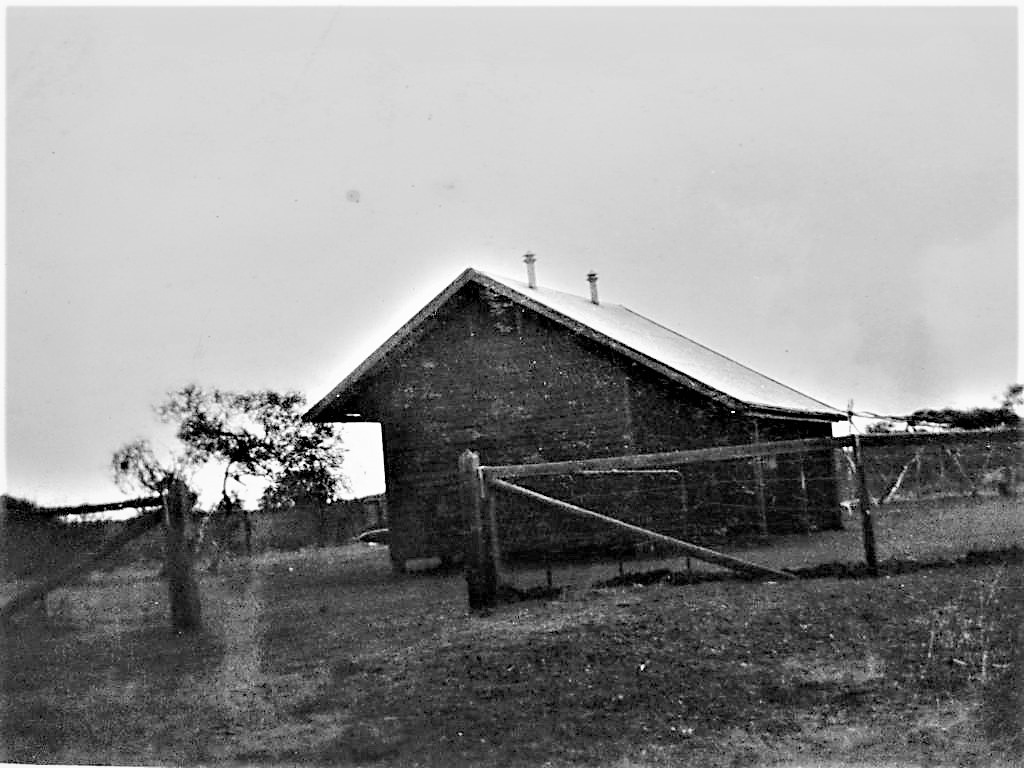
This School that was built in 1915
August 18th 1913
Geraldton Guardian
Local and General
Samples of local wheat; There are on view in Guardian Office two excellent samples of local wheat. One is a specimen of “Alpha”, grown by Mr. H. J Stafford, of Tenindewa, who says he has 300 acres as good as the sample, the crop is looking “bonza”
The other sample is of “Bunyip”, brought in by Mr. Tim Cream, from Mr. Author Meadowcroft’s place also at Tenindewa. It is part of a 150 acre crop, which is looking remarkably well, and on the same farm is another 150 acres of “Federation” presenting nearly as good an appearance.
August 25th 1913
Tenindewa Country
Within A Ten-Mile Radius (By Sentinel)
Despite, the chronic grumbling of farmers, and the infinitesimal amount of faith which they show, (the proverbial grain of mustard seed is a football compared to it) the Almighty has been very complaisant to them in this year of grace. The months of July August, (the latter as far as it has got) have been ideal -from the cocky point of view, least in respect to rainfall. I don’t know the official number of “points’ that have been scattered around, but there has been a continuous supply of the necessary fluid over the past six weeks, with lovely “growing” days sandwiched in. As a consequence, the crops all round are looking supremely hopeful-indeed their daily rise in stature can almost be distinguished with the naked eye.
It’s true that a well known gentleman of the [Greenough] Flats (who has the faculty of observing highly developed) who once resided in this district, said that he lived 10 years at Mullewa. and it never rained even once during the whole time.
Tenindewa’s Official Rainfall for 1913; June 53mm July 56mm August 72mm Sept 53 mm Total for 1913 288mm or 1152 points as it was measured in those times
My experience of this country is but meagre, so I can’t say that statement is strictly veracious. But, if so, then the Clerk of Weather has executed a lightening change, almost as complete as that of a certain politician and has set the tap going in a manner to delight the most pessimistic of farmers.
I hope, shortly, to supply you with details as to the number of acres sown in this circle and also the fallowing done, with other information likely of interest. The result may astonish some of the confirmed croakers (at a distance) who always place Mullewa and its vicinity on their “Index Expurgatorius”-who persist in denying its agricultural possibilities, and deem the man who invests about here a candidate for Registrar Mr. Mosely’s kind attention, or for the costly institution at Claremont devoted to the misdirected genius.
In this locality, a new departure has been adopted in the manner of “mullinising” by the employment of motor-rollers, consuming benzine.
One of those is run by Mr. Willcock, and has been prancing around, leveling scrub and infant salmon gums in great style. Another is owned, if not piloted, by Frank McGuinness, the well known agriculturist of Bootenal, and he starts this week on some nice thick jungle of his own, which adjoins the property of Mr. J Keefe. [sic] Both of these pioneers of wheat growing in the hitherto much disparaged locality, hold big chunks of the famous “Lawes Estate”
After I have seen the working of these juggernauts, and carefully examined the result of their exertion, and have calculated the comparative cost and efficiency of rolling by oil, horse, and bullock-power, I will let you know the result. Judgement reserved sine die.
The winter weather here so far, has been mild. Frosts are not unduly severe, nor frequent, and there has been admirable alternation of brilliant days and genial showers.
September 5th 1913
Tenindewa Country (by “Sentinel”)
Since I last wrote the weather conditions in this district, continue to be everything desirable, from the agriculturalists point of view. Given an extension of complacency on the part of the Celestial Weather Bureau in the shape of a fair sprinkling, during the next two months, and the whole of the crops around our circle will be holding up their heads at harvest time, unashamed and ready to challenge comparison with the best the Greenough and Irwin can show.
Appended is a list of some of our most prominent farmers, with the acreage under crop, as nearly as I have been able to get. A Meadowcroft 300: H. J. Stafford 400 acres: Hunter Brothers 450acres: N. Fry 600 acres: Pat Malony 100: Jones Brothers, 300 acres: W. Carson, 100: O’Loughlin Brothers 300: Puckle and Russell, 500: J.J. Keeffe, 300: O’Dwyer, 100: W Thomas, 100: Joe McDermot, 60 L Driscoll,100: W Coaper, 300; L. Critch 200: J Rumble, 100: Oldham and Tullock. 150: Waldeck Brothers, 100: B. Fuller, 100: J. Bowers, 100: W. Willcock, 200: L. Walker, 300: Woods and Radford, 150: Dan Cream, 200: W. Smith (oldest pioneer) 50: J. O’Callaghan, 100: Jack Giles, 50: T. Criddle, 150: May and Son, 250: F Green, 150: H. Johnson, 100: Inspector Homes, 300: Tiller brothers, 300: W. Stokes, 100: M.F. Troy, 100: G. McArlie, 100:
As most of these have been but a short time tackling their holdings and have met with severe rebuff at the outset from an unpropitious season, the result they have already achieved speaks volumes for their grit and perseverance. they are truly, of the stuff of which is manufactured “a bold yeomanry, their country’s pride”
Even the above incomplete category will give your readers some approximate idea of the importance which agriculture is assuming in this hitherto contemned and belittled country. It shows that over 8,000 acres (3200 hectares) are under crop this year, in this comparatively small belt, which with ordinary good luck–or maybe a bit chucked in–should pan out 160,000 bushels of wheat [est. 1.5 tonne per hectare]. Also, an immense amount of fallowing has been, and is being done, and the acreage next season should be double or treble as great.
Mullenising, [sic] tractor-rolling, and burning off are in full swing, and everything points to the Tenindewa cum Mullewa wheat area becoming one of the most important in the whole province–not even excepting the marvelous Three Springs.
Socially, I have next to nothing to record. Mullewa, of course, is our head centre, as regards relaxation or amusements, with Tenindewa Town kicking up feebly occasionally. Your Mullewa correspondent seems a bit torpid. Anyway he (or she) doesn’t spend a fortune in copy-paper and stamps. At one time the “Express” was fairly deluged with correspondence from Warren-town, [Mr. Warren was the Mullewa Road Board Chairman at that time] and there was no lack of quill-drivers, of various sexes, ready to jot down all the news, and furnish elaborate reports of everything that occurred in that wind-swept town, and a lot that didn’t. But now-adays, one hears mighty little of it. Perhaps Governor Barron may take a trip there during his visit next week, and that may shake up the local scribe a bit, particularly if Lady Barron comes along.
In another letter, I hope to induce the aid of the editorial fountain pen, and the best leaded type, towards persuading the Government to acquire and throw open thousands of acres of good available land in this vicinity, besides preparing for selection other blocks already in their own hands. They made a decided blunder in not purchasing the Lawes Estate, when they had the chance. Even, now, an absentee holds 13,000 acres (5100 hectares) of this valuable country, every inch of which would be eagerly snapped up by legitimate settlers. If properly subdivided and reasonable terms, such as the Bath Department gives, were asked. Further, I propose to give an unbiassed account of that very live body, the Mullewa Roads Board (which hasn’t always born the reputation of being a happy family) and will perhaps, be able to show cause, why the Board is deserving of more generous assistance from the Treasury than it heretofore has received.
September 16th 1913
Tenindewa Notes (from our own Correspondent)
We have had nice rains again, and I think crops are assured round this district. Messes Stafford and Son were to commence cutting some nice Alpha for hay on Monday the 15th. The hay is about five foot (1.52 meters) high, and a nice even crop. The ears on this crop are very large, many exceeding six inches (15.24 cm). I think this will be the earliest part for new seasons chaff in the Victoria District. Alpha seems to do better than any other variety of wheat in the Mullewa area, and a good many are promising that they will Alpha in next year. A farmer from Mullewa the other day remarked he was glad there was one sensible farmer in Tenindewa, because this farmer had nearly all Alpha sown.
The improvements at the railway siding are progressing well, but the waiting shed should be shifted to its new site at once, as at present customers are put to great inconvenience to obtain goods or parcels. They have to go round about 3/4 of a mile (1 kilometer) to the new level crossing or carry them about 50 yards (45 meters) and get them through a 7 wire fence, one barb. They are building a goods shed, which could easily wait till after the waiting shed was removed. There are no signs of the sheep loading yard yet. Surely the Railway Department will not take the men away from here till this very necessary matter is taken in hand.
A funny thing happened at Mr. Sutton’s lecture here recently on wheat growing. He was showing a crop with manure and one without manure, and funny to relate [but] a man with a bald head was sitting in front of the lantern and where he had the fringe of hair just met the “with manure” and his bald patch “without manure”. There was a general laugh and the lecturer asked him to bob his head down.
A new road is badly wanted through Wollya Reserve (945) to the new entrance to the siding level crossing, otherwise farmers at the west end will have an extra mile tacked on to the present distance. The Mullewa Roads Board might note and help.
Farmers around here appreciate the bag and wheat quotes [prices] given in your paper. It is a good help to them.
October 10th 1913
Geraldton Express (Tenindewa and Mullewa)
A Flourishing Wheat District (By Viator)
Having been fortunate to accept an invitation to join a party of business men on a tour through the Tenindewa and Mullewa districts, which up until lately was associated in most people’s mind here, with nothing better than mulga scrub and sandlewood, I consider it only fair to let the so-called authorities on wheat lands know what these districts are doing to add to the increasing wheat exports of Geraldton.
We joined the train on Sunday afternoon at 3 o’clock and, at Northern Gully, our party was added to by a welcome addition in the person of Mr. Pat Stone who was to show us the country that for so long, has been dormant.
After leaving Northern Gully we were able, for some time, to see green waving corn at intervals, but eventually the monotonous sandplain became our only landscape.
After about 30 miles [50 kilometers] the country suddenly changes and the monotony was relieved by a good stretch of timber. By this time we were coming close up to Tenindewa, where from all accounts there will be over 20,000 bags [1600 tonne] of wheat railed this season.
Arriving at Mullewa up to the time we alighted at the station and made for the refreshment room, we were greatly surprised to find all “Mullewaites” were “travellers”. The strange part was they nearly all changed their minds minds before the train left, but not until they had visited the refreshment room mentioned. Perhaps it was the square cut sandwiches that attracted them…..perhaps the “globe” shaped pies? After a deal of elbowing and jostling, we too were invited to taste a pie of two, and found we were noy so thirsty afterwards. [Note; Some sinical humor being inserted here by the journalist regarding the Refreshment Rooms being the only place in town to have a Liquor licience on a Sunday]
On arriving at the hotel we found out thoughtful friends had secured accommodation for us, and having partaken of a very good meal, we strolled out along the “Marine Terrace” of Mullewa, where the air was clear, light and bracing, and compared delightfully with our moisture laden atmosphere near the coast.
On returning to “The Railway” we met landlord Fuller … who lately gave up taking deposits over a bank counter for a most lucrative occupation behind a brass-edged counter, where judging by the number of depositors he now deals with, he has no need to worry if the teller’s cash does not exactly balance each night.
We spent a very pleasant evening listening to the old time experiences of Councillor P. Stone.
In the morning we made an early start before breakfast under the guidance of Mr. Keefe. [sic] We were agreeably surprised at the large areas of uniformly good land, the usual patchy paddocks of many other districts being non-existent here.
The following farms with about 100 acres [40 hectares] each under crop all looking well, were visited; Haffner’s (now Clarke’s), Bradford and Wood, and Willocks.
We the drove on to Mr. Keefe’s [sic] property, and after a good breakfast we inspected this property, which only a few months ago was in virgin state but now has 200 acres [80 hectares] of crop looking first rate although put in late. In addition 100 acres [40 hectares] are now fallowed, and 250 acres [100 hectares] more cut down ready for burning. We passed F.J. McGuinness’s and O’Brien’s holdings.
The next property visited was Meadowcroft’s where there are three different paddocks under crop totaling 320 acres [140 hectares] of which 280 acres [110 hectares] is fallow land.
A area that was greatly admired was a large sized paddock under crop (mostly wheat) of which Rutledge and Willis are the owners. This reflects great on Mr. Hunter, under who’s management the farm is worked. Crossing the line near Tenindewa we passed Critch’s property with 170 acres [70 hectares] under crop (100 acres [40 hectares] fallow land) and then went on Mr. H. J. Stafford’s, where the owner, not by any means a young man, was able to show what energy and perseverance can do, and we all agreed that the crops reflected the greatest credit on the owner, who is very optimistic with regard to the possibilities of the district, and we had seen enough of good crops to agree with him.
We then returned to Norman Fry’s holding, “Kaburnie” , where an excellent dinner [lunch] was ready for us to which we all did justice, afterwards remarking that none of us had any idea that our appetites could increase so amazingly and good victuals disappear so quickly.
On this holding 605 acres [240 hectares] are under crop (320 acres [123 hectare] fallow land) and on a safe calculation the average return should be well over 20 bushels per acre [1.35 tonne per hectare]. Mr. Fry is an energetic up-to-date farmer, who would be welcomed in any district, and who is always willing and able to impart useful hints and information to less experienced neighbors.
We now had a change of horses, and visited Rumbles’ property, with about 200 acres under crop [80 hectares] (120 acres [55 hectares] fallow land), and then Couper’s was made for. At Mr. Couper’s place one large paddock of 500 acres [200 hectares] (all fallow) was seen to great advantage.
We realized here that large areas like this could be worked at much less cost than the paddocks, cut into all shapes and sizes, so often seen in other districts.
On the way back to Mullewa the following places were passed :- Thomas, 70 acres under crop; Callaghan 125 acres; Smith, 50 acres; D. Cream, 200 acres; L Walker, 300 acres.
On arriving back at “The Railway” another change of horses was effected, and then we struck out in an easterly direction visiting W. Dermot’s (50 acres under crop) Criddles’ (about 100 acres), Tiller (250 acres) and Carsons. At Mr. Carson’s place we were entertained by the good housewife and refreshed by afternoon tea. The crop on this property looked exceedingly well, and should easily average 22 bushels per acre [1.4 tonne per hectare]. A very good show of green vegetables showed what could be done in this connection.
As time was getting on we had to get away. We next visited a splendid belt of timber owned by Laughnan Brothers with 300 acres under crop showed the possibilities of this district.
Inspector Holmes has an adjoining block, and his crop was all that could be desired. The 105 acres in crop should easily average 23 bushels per acre.
We then drove to Jones Brothers farm where there was an amazing evidence of rapid progress. The crop (130 acres) here was also looking exceedingly well, about 80 acres being on fallow.
We were then driven back to the station. After a very enjoyable and instructive day we realized that in the not far distant, when these districts will prove to the skeptical, that with fallow land largely used, the soil, the climate are in every wat suitable for wheat growing having as good a rainfall as Kellerberrin, which nobody doubts as suitable, with fallow.
The fine stamp of farmers met all along the route are determined to prove this, by the best means, that is, the number of bags to be stacked at the stations. This evidence will soon make their land eagerly sought after, and correspondingly good prices will be obtained for their farms should they at any time put them on the market.
We left Mullewa feeling that the day had been well spent and grateful to Messrs. Keefe, Fry and Jones for their courtesy and kindness in enabling us to see such a fine stretch of country in the short time at our disposal.
October 28th 1913
Tenindewa Notes (From our own Correspondent)
Messrs. Stafford and Sons have taken off a very nice hay crop of 50 acres for a yield of 80 tons. The variety was the good old wheat “Alpha”–it should be called the reliable. Hay cutting is general and most have now finished and some very nice stuff has been cut. Crops generally are looking very well and stripping will begin in a few days now as the fields are looking ripe. Grass is very plentiful and there will be a great danger of fires this year so all should be very careful until crops are sold of protected.
We had some visitors to our district lately in the shape of several Bank Managers accompanied by our good friend Mr. Pat Stone. They had a poor impression of things around here prior to their visit, but now, I believe cocky could tap them for a loan after what they saw. They were really surprised at the possibilities of this district, and the good country seen and the amount of good feed going to waste. If banks were not so close with their funds some of it could be earning good interest with no risk in providing sheep for this district. There is room for thousands, and the lamb trade people need not be afraid of a shortage as thousands [of them] could be raised around here yearly.
The State School site has been inspected and it is hoped the new building will be provided for the teacher, It is very badly needed.
Our siding is looking very spic and span and under new paint. We now have a good ramp, nice goods shed and waiting room but no provision for trucking our sheep. It would only cost a few pounds and would be a great boon for the settlers. I know one settler that had to lift lift 75 fat sheep on to the top deck [of a stock carriage] and it was no fun. Others drive (herd) their sheep to Mullewa which means anything from 10 to 15 miles. A few old sleepers would provide a small yard but the railways are like the cow’s tail…..always behind. They will do it after we have put up with a lot of inconvenience for a few years
Quite another nice green crop of wheat is growing since the hay was cut, and my word, wouldn’t some lambs eat it and put on fat, and bring in boodle?
October 29th 1913
Tenindewa Notes (By “Sentinel”)
In this pushing patch [sic] of the big Victoria District the binders are busy at work, and some fair idea can be formed of the probable returns from the crops of this year. The season, as is known, opened very inauspiciously, and the needful rain was disappointingly late in making its appearance. There is consequentially a big area of later sown fields, which however, are in the main looking very healthy. Here and there stand out prominently some fields of exceptional promise. But one hears from various sources the opinion that the average yield all round will not exceed 5 bags per acre. [one tonne per hectare]
There are nearly 10,000 acres [4000 hectares] seeded on this territory which means that 50,000 bags will be handled this year, and give Commissioner Short the chance to clap a few more pounds [ ie dollars] demurrage on the poor cocky. Meadowcroft (jnr.), who has a very tidy crop this season, is not over sanguine as to the average crop over the whole district and says some of the crops, estimated by distinguished visitors (who were buggied around by Jack Keeffe) as likely to cut 25 bushels will be lucky to reach 15. “But” he added, “I always put my estimate a bit low. Then when a bumper crop is reaped, there is a sort of pleasurable surprise, and that’s a sensation worth having these times.”
Leo Critch (who takes to farming like a pressman to “Liqueur Cream”) has a good looking paddock, and others such as Hunter Bros, Pat Maloney, Norman Fry, and a few more are to be congratulated on the solid appearance of their crops. Altogether the Mullewa and Tenindewa yield may be fully expected to keep up our end of the stick, to at least the figure for last year for the whole Victoria District, which was, I believe, 14 and a half bushels.
Mullinising is in progress in many parts. The experiment of tractor rolling is still being tried, and as soon as the necessary statistics are getable, I will ask you [the editor] to publish them, so as to present to the incipient farmer, in fair comparison of the cost and efficiency of several methods of clearing virgin soil. At present it is plain that the most pressing want in the mullinising-machinery world line, is a tractor that will be sufficiently powerful to roll thick scrub and sturdy saplings, yet light enough to get over heavy and sticky land at something over the walking pace of a short legged man. And this will be found.
Mullewa possess two full-blown policemen who haven’t to graft too hard at least among the cockies , who are, notoriously, a law abiding lot. And in the town there isn’t much to do outside the “fusel-oil” fools. Anent the latter, its said that those elbow-lifters, who hither to loved to look upon the rum when it was red, and the beer when amber brown, are finding Mullewa isn’t a bosher place to get shickered. For the local Bench generally consists of two, rank teetotalers, who haven’t the faintest sympathy with the beer-eaters and don’t hesitate to “sock it into them” every chance they get. No rabid water-wagon man should venture to try a drunk. Its not giving him (or her) a fair chance.
But though the farmer proper is mostly a well-disposed person, seldom needing the kind attentions of the police as towards himself, there is often work for the latter even in the bucolic bush. For example a settler, the other day, found a favorite mare of his (which had been turned out in good condition) in a perilous state, showing that it had been ridden by some brute to such an extent, that it’s hocks were swollen to the size of two match-footballs. and that its sides were decorated with blood stains. Another lost three valuable dogs, which disappeared–actually vanished off the face of the planet. Things like this should be dealt with by the Police Court process, and they would, too, but for the strange disinclination to call in the strong arm of the law, which the farmers usually evince. Mullewa and district has nothing but approbation for the spurred and booted “lawnorder” boys. They are not unduly officious, and do their spiriting gently. The station master also–the one we had I mean– was uniformly courteous and obliging. The same can’t truthfully be said of his yocum-tenens who bosses the yard and sheds at present, and who doesn’t waste any more civility on the public who keep him in his billet, than he can comfortably help.
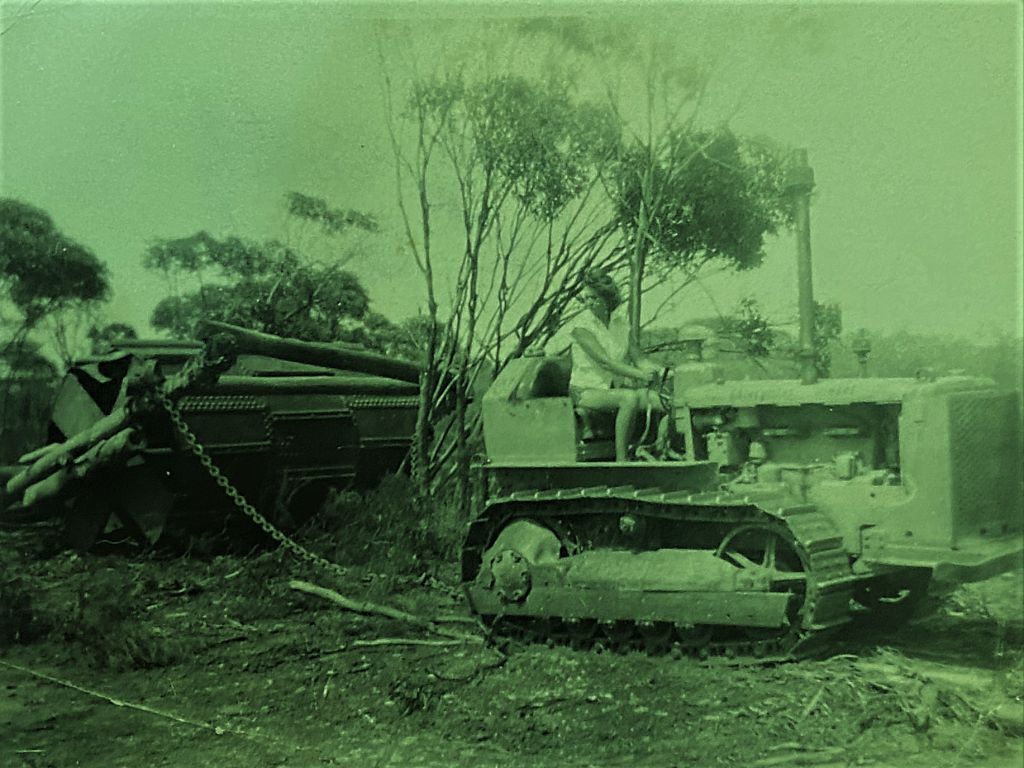

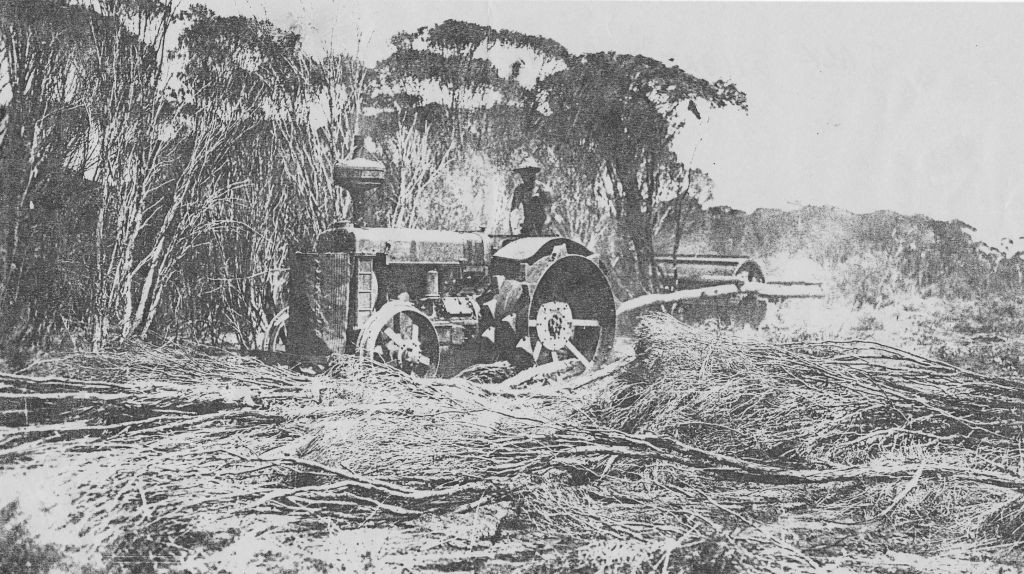
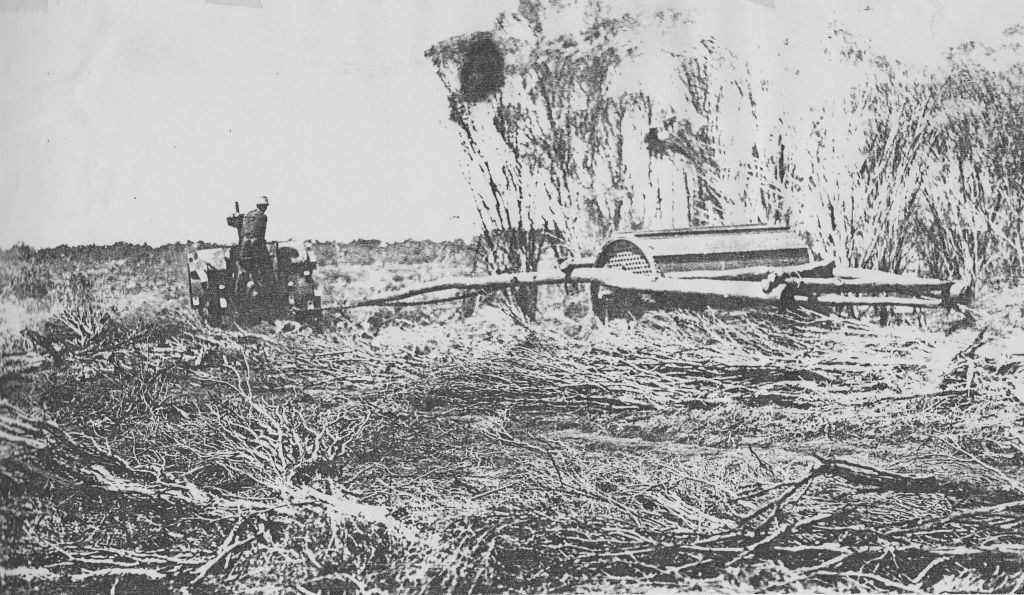
November 18th 1913
Our Tenindewa Trip (By C.O.N.)
Geraldton Guardian
[This exceptionally written article is possibly by a Mr. E Constantine. See article July 28th 1917]
We had been falsely accused of holding a poor opinion of the Tenindewa country. We would never ascertain how such an impression existed, as we were not aware that we has said anything derogatory the district. Whenever we spoke of Tenindewa it was from hearsay. as we had never been there. We concluded therefore, if fault there was, that “hearsay” was to blame and we had better go to Tenindewa, and see for ourselves. There was a standing invitation and offer to pilot us round from Mr. H J Stafford, the enthusiastic ex-station master of Geraldton, so none fine morning we set out with a light heart. In the pre-railway days and up to the time it blossomed forth as an agriculture centre, the district was known as Wolya. The old Wolya well was a favourite camping place for weary travellers across the cruel sandplain, on the road to Mullewa and en-route to the Murchison. Contrary to usual practice, the railway department (or whoever named the siding) has since endowed it with a more euphonious name —Tenindewa—how glibly it runs ! We are told it a most beautiful place in Spring, and we shall not be surprised if, in the near future, such a beautiful place with a beautiful name is not the theme of a spring poet.
Tenindewa is almost due east of Geraldton, and as the train crawls 55 miles distant. En-route the train attains at Indarra, eight miles from our destination, a height of 895 feet above sea level. As Geraldton station is only 5 feet higher than the sea, there is some justification for the crawl. Tenindewa itself is 641 feet above sea level , just a little higher than Grants siding (Newmarracarra). Mullewa, ten miles further on is 250 feet higher still. It will be seen how irregular are the gradients on this railway. When Mr. Charles Smith realizes his ambition and is able to take a ticket from Yuna to Mullewa direct there will perhaps, be fewer snorting and puffing locomotives running on the Geraldton-Mullewa section. The train service from Mullewa is fairly convenient, but it is quite the reverse from Mullewa. The residents of the district should take time by the forelock and press for a timetable that will enable them to visit their metropolis , Geraldton, and reach home the same day. When the Mullewa-Wongan-Hills line is taken over by the Department, Mullewa will no doubt be treated as a junction station, and the district timetable arranged accordingly.
On arrival at Tenindewa we alight at the spick and span station, and are heartly greeted by the ex-station master, who looks a typical pioneer—bronzed certainly, but still wiry, and emblematic of his old railway sobriquet. There is the usual assortment of countryside parcels to be gathered up for ourselves and friends, the all important mail to be secured, and we set out behind “Duke” for Mr. Stafford’s homestead, on the banks of the Kockatea Gully, three miles distant, where we were heartily welcomed by Mrs. Stafford and her daughters. Their healthy appearance and their assurances that they enjoyed the “simple life” that falls to the lot of those that go on the land, were happy auguries for the tenor of those notes and eloquent testimony to the climate of Tenindewa. Mr. Stafford’s homestead is comfortable but unpretentious. It is built of iron, and provides ample accommodation for his large family and occasional travellers like ourselves . He jocularly refers to the fact that the original portion was, like the world, built in six days . Mr. and Mrs Stafford wisely deferred the selection of a site for, and the erection of, a permeant building until they had got used to the place. They have now selected the site, and it will not be long before home is laid. After refreshing the out and inner man, we take a stroll whilst our steed “duke” is recuperating for a hard afternoons work.
Enthusiastic though he is as to his prospects, as a wheat grower, it is satisfactorily to note as we emerge from the house that Mr. Stafford has not deserted his old love, and he continues to breed high-class poultry. As is well known, he enjoys a reputation in the poultry world and in the show pens. Hundreds of white leghorn fowls of all ages flit here and there as we pass along the incubator room, which contains two machines. Several foster mothers are distributed on the grassy slope adjoining the house, and it the distance numbers of turkeys are contently picking as they roam. Needless to say, the returns from Mr. Stafford’s poultry yard are satisfactory.
We next come to a fair sized paddock, fenced with Cyclone netting and barbed wire, which has just been completed, and is intended to keep the pigs within bounds., Mr. Stafford having decided to go in for pig breeding, as part of his scheme of mixed farming. Four excellent sows in litter have been secured for a start, and a boar has been ordered from Newmarrcarra [sic]. With an undoubted demand for pork and bacon in the district, there should be money in the business. Although he has only been on the place for four years there is sufficient shed accommodation to keep all the machinery and horse under cover. And there is ample plant for working the property in its present stage , the machinery comprising of two binders, a harvester, a winnower, a chaff cutting plant, driven by a benzine engine, besides vehicles etc.
Mr. Stafford’s horse flesh was unfortunately seriously depleted during the year by the death of two draught mares whilst foaling. The two were valued at 100 pounds [$200.00] “Its all in the game” philosophically comments our guide, as we inspect the working teams . We did not see the sheep. The present flock is quite a recent acquisition, and having a strain of Shropshire, had inconsiderably walked through the fence, and sampled the crop. Fortunately they were discovered before much damage was done, and placed in a distant paddock.
As we wished to see something of the district that afternoon, we now returned to the house , and harnessed up for a 20 mile drive around the host’s and neighboring crops.

Part 2
Next morning we travelled through some excellent grazing paddocks belonging to Mr. Stafford. In some places along the creek there is a good deal of saltbush growing, which is excellent feed for sheep, and is being largely cultivated for that purpose in America.
We happened across the camp of Mr. Crommelin, a new settler, who has taken up 800 acres, adjoining Mr. Stafford’s holding. Mr. Crommelin only began work on Aug. 29 of this year, since when he has single-handed [sic] erected a comfortable camp and cleared 40 acres of his land. He intends having 100 acres under crop next year.
We spent half-an-hour at the homestead of Mr. H.W Johnston, who hails from Greenough, and has spent some time in the Murchison. He has a very comfortable three roomed cottage, and has about 35 acres under crop, the varieties being Federation, Alpha, and Bunyip. His return will be about 15 bushels to the acre. Mr. Johnstone only began work in January of this year. He is satisfied he will do well on the 980 acres he has taken up. After sampling some dainty cakes and a cup of tea, hospitably proferred [sic] by Mrs. Johnstone, a Northampton lady, we continued our journey.
The next holding visited was that of Mr. Palmer, a new arrival from England. This gentleman was a journalist and a schoolteacher in the Old Country, but anyone seeing him as we did, in the act of chopping down a big York Gum tree, would scarcely imagine that he had been used to any other than laborious work. So well is Mr. Palmer satisfied with his prospects in this new country, that he has sent home for his wife and family to join him, and they are due to arrive shortly. He has 50 acres of Timber cut down and the land ready for cropping, and with the assistance of his sons hopes to have another 200 acres ready by seeding time.
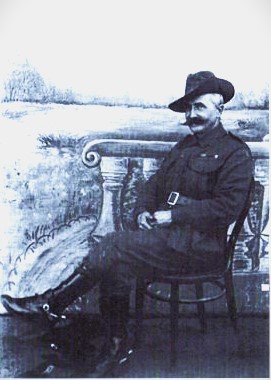
Percy came to Tenindewa in 1913
In the afternoon we set out in a westerly direction, and after crossing some good sandplain country, came to the holding of Mr. Hunter, who we were informed, has 700 acres under crop and expects an average yield of 15 bushels. The variety is principally Federation. We passed through Mr. Frank Green’s paddocks, where there is a splendid field of 120 acres of Alpha which should go at least 20 bushels to the acre. This property is overseered [sic] by Mr. Shaw, an experienced farmer.
Mr. M. F. Troy’s holding adjoins. It consists mostly of York Gum country, timber that will provide excellent exercise for the legislator farmer between sessions of Parliament, and an agreeable change from the unpleasant duty of calling unruly politicians to order. There are 120 acres of growing crop on this holding, Federation and Bunyip, and the yield should be around 4 bags to the acre.
Strange to say, the last crop seen, that of Mr. Maloney, of Walkaway was the best we had come across during our two days of travelling. The road crosses the cultivated field and there was just room for the sulky to pass through without damaging the crop. For the full width of the paddock the ripening heads of wheat were on a level with the seat of the sulky. It was crop that would that would take beating anywhere, being thick and even. The harvester had been around a few times just previous to our visit, and the yield was at the rate of 29 bushels to the acre. As this was from the outer fringe, which had suffered the usual damage from parrots and kangaroos, we would be safe in saying it was a 30 bushel crop. The varieties were Crossbred 73 and Comeback.
We were not able to visit all the farms in the Tenindewa District, but were able to gather a few particulars about some of the crops we did not see. Mr. A Meadowcroft has about 300 acres under crop, Mr. Valentine and Dunkin, 400 acres; whilst Messrs. Routledge and Willis (a Law-lers [sic] firm) have also a fair acreage.
Altogether there are about 3000 acres to be harvested at Tenindewa, and as the average yield will be about five bags to the acre, the district’s contribution to the wheat yield of the State will be 15,000 bags. Not bad for country that was a sheep walk five years ago. The wheat growing properties of the land have been proved this season, the rainfall having been up to the average, and as more land is cleared and the farmers are able to go in for fallow there should be no failure of crops even in a bad year.
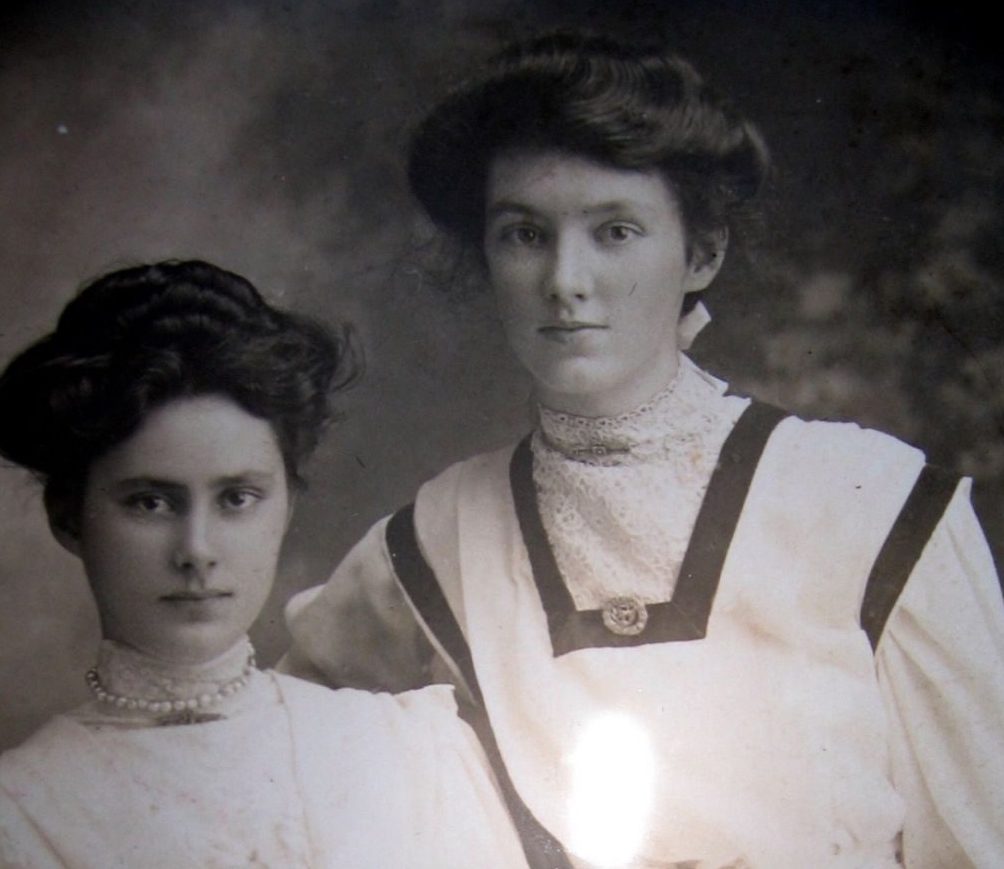
Sisters Rose Isobel Nell Stafford and Eva Mary Fyle Stafford
December 6th 1913
Tenindewa Notes (from our own Correspondent)
Farmers are very busy harvesting the golden grain, and so far they are satisfied with the yields. nothing under 15 bushels has been bagged, while others are up to 30 bushels. What about squaring accounts this year this year? It looks good enough for farmers to do it, or nearly so. A number of trucks of wheat have already gone to Geraldton, but the Railway Department have apparently the W.A.T.F., and there are trucks of wheat at Tenindewa siding now that were loaded last week, one last Wednesday and one last Saturday. I thought the Railway department kept a record of all trucks daily movement. It strikes me only some have a weekly movement. The Geraldton officials should watch the siding closer, as farmers have engagements to meet and these delays at sidings are most unsatisfactory. No sheep yards have been built here yet. Will Mr. Sam Elliott please take notice as we have no member now.
The Mullewa Roads Board have notified farmers that that they have to erect 14 ft (3.2 meters) gates across public roads, and to put up a notice printed with letters not less than 4 inches long (10.1 centimeters) (“Public Road”) It is just as well to advise the public that they are roads, as in many cases they would not know they were. I suppose the wise men who meet in Perth re. Roads Board Conference are responsible for this printing business and 14 foot gates’ It may be all right in old settled districts, but after two seasons of failure of crops it is on a par with the prosecuting for rates recently. While on this prosecuting for rates, I wonder why the Board doesn’t insist on their secretary (a very capable officer) prosecuting these cases instead of putting the defendants to the expense of a lawyer, as well as secretary’s costs etc.
The roads are getting in a very bad state with wheat carting and perhaps will send the supervisor round to see where a bit of gravel would mend matters and improve all roads a bit, instead of spending all the money on a couple of roads.
Tenindewa has a good shed at the Railway Siding, but it is not equipped with a wheat truck [trolley] or scales. If the superintendent only heard the language of the poor farmer when trying to push trucks at the siding he would send out a pinch bar at once.”
Whenever any land is thrown open around here it is snapped up at once, and still a number of people want land in our neighborhood.
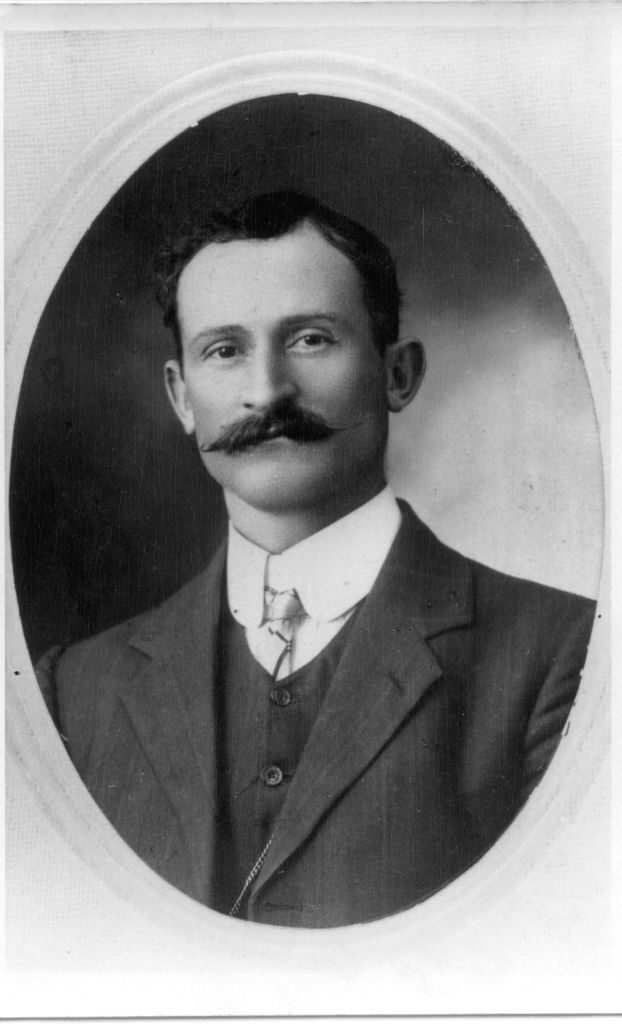
Tom Moore MLC and Indarra farmer